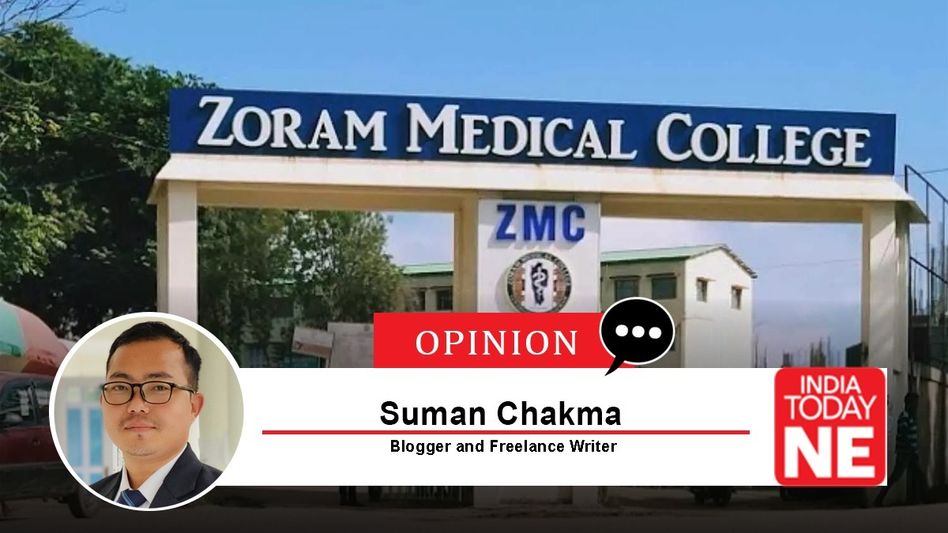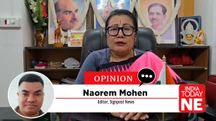Chakma Students Making Their Mark in Mizoram’s Medical Journey
Chakma students in Mizoram continue to excel in medical entrance exams, overcoming challenges to secure top ranks and help shape the state’s future in healthcare. Their success story reflects resilience, merit, and a growing influence in Mizoram’s educational and professional fields.

Chakma students in Mizoram have once again demonstrated notable academic success by securing top ranks in the 2025 National Eligibility cum Entrance Test (NEET) examination, highlighting their consistent capability and dedication to higher education. Notably, Dr. K. Joseph Chakma from Kamalanagar, headquarters of the Chakma Autonomous District Council who completed his M.B.B.S. from Zoram Medical College & Hospital, the lone Medical College in the state in 2024, has also cleared NEET-PG exam this year with a score of 525 out of 800, securing an All India Rank of 17,128, adding to the legacy of academic excellence among Chakma youth. Despite the challenges posed by the state’s reservation system, which divides indigenous Scheduled Tribes into three categories with differing seat allocations, Chakma students have continued to excel in competitive exams such as NEET, underscoring their merit and commitment to higher education.
Mizoram’s reservation framework, particularly the State Technical Entrance Examination (STEE) Rules, 2016, divides indigenous Scheduled Tribes into three categories: Category-I predominantly comprising the Mizo/Zo ethnic groups; Category-II including the Chakma community along with other minority tribes; and Category-III for candidates whose parents are Central or other State Government employees not permanently serving in Mizoram. This policy allocates the majority (95%) of total reserved seats to Category-I candidates, while Category-II is allotted only 4%, and Category-III just 1%. Consequently, Chakma students, despite qualifying through merit, face relatively limited access to professional courses within the state.
This system of selection continued until 2019, when the Gauhati High Court scrapped the amendment to such rules and restored the indigenous Chakma community under Category-I following a Public Interest Litigation (PIL) filed by the Mizoram Chakma Students’ Union in 2016 challenging the discriminatory reservation rules.
The 2025 NEET merit list for Mizoram reflects the academic performance of Chakma students, with several ranking prominently. For instance, Helang Chakma secured Rank 22 with a score of 383, while Nimika Chakma achieved Rank 77 with a score of 338. Other Chakma students also placed competitively, indicating a strong trend of educational attainment within the community for this admission cycle. These results reaffirm the academic potential of Chakma students in Mizoram’s evolving educational landscape.
Legal frameworks and court rulings have played a crucial role in ensuring procedural fairness concerning reservation policies and seat allotments. The Gauhati High Court’s directives to Mizoram authorities to maintain equitable treatment of candidates in alignment with constitutional provisions. This judicial oversight has contributed to efforts to uphold merit-based admissions alongside the state’s reservation practices.
Beyond individual accomplishments, Chakma students who gain admission and complete technical and medical education contribute meaningfully to state development. Many go on to serve in healthcare, engineering, and various professional sectors, particularly in remote and underserved parts of Mizoram. Their inclusion in these fields broadens representation and supports the enhancement of both technical and social infrastructure across the state.
The broader narrative highlights the academic excellence of Chakma students within the existing educational and reservation frameworks, without invoking political or social controversies. The community’s achievements reflect a strong commitment to education and professional growth amid structural challenges, benefitting both the Chakma community and Mizoram as a whole through increased access to skilled professionals and improved service delivery.
As Mizoram continues to develop its educational policies and infrastructure, the consistent performance of Chakma students serves as an encouraging indicator of inclusive growth potential. Their achievements reinforce the importance of merit-based access to education, balanced with reservation policies designed to ensure equitable opportunities for all recognized Scheduled Tribes in the state.
---
This factual overview of the Chakma community’s academic performance and participation in Mizoram’s higher and technical education system aims to provide clear, balanced information grounded in verified data and official merit lists for 2025 admissions. It reflects the ongoing efforts of students and institutions working together toward educational advancement and inclusive development.
Copyright©2026 Living Media India Limited. For reprint rights: Syndications Today









